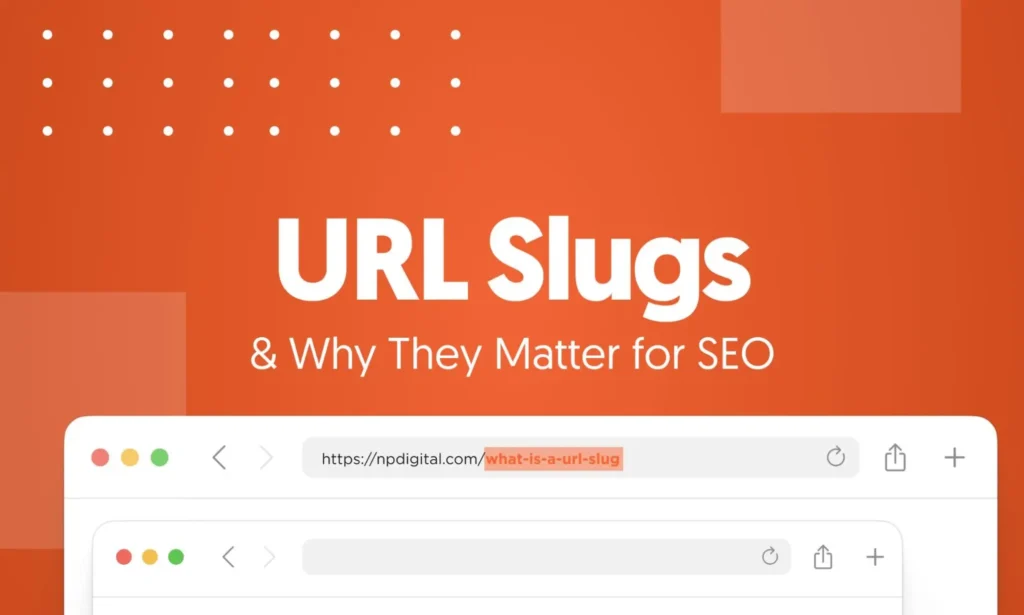Your URL slugs might be the missing link in your SEO strategy. These small but powerful elements of a URL can impact search engine rankings, click-through rates, and user experience. Learn why they matter and how to optimize them effectively.
Key Takeaways
- Improve Readability: Concise, descriptive slugs make content easier to understand for users and search engines.
- Boost CTR: Clear slugs give users confidence about your content, encouraging clicks.
- Keyword Relevance: Adding relevant keywords provides context for users and signals search engines, even if it’s a minor ranking factor.
- User-Friendly URLs: Clean slugs are easier to share, remember, and navigate, improving trust and engagement.
- Simplify Navigation: Avoid unnecessary characters to streamline your URL for both search engines and users.
What Is a URL Slug?
The URL slug is the part of a web address that comes after the domain and folder path. For instance, in the URL https://example.com/blog/seo-guide, the slug is seo-guide. Slugs act as a quick identifier for a page’s content and play a role in user trust and navigation.
Why URL Slugs Matter for SEO
While Google considers slugs a “lightweight ranking factor,” well-optimized slugs significantly improve user experience. Descriptive URLs like /email-marketing-tips outperform generic ones like /123abc45 by building trust and increasing click-through rates.
Best Practices for Creating URL Slugs
- Be Concise: Keep slugs short yet descriptive.
- Example:
/email-marketing-tipsinstead of/the-best-email-marketing-tips-for-every-business.
- Example:
- Use Hyphens: Separate words with hyphens, not underscores or spaces.
- Example:
/best-hiking-trailsvs./best_hiking_trails.
- Example:
- Stick to Lowercase: Use lowercase letters to avoid confusion and broken links.
- Example:
/digital-marketing-tipsis better than/Digital-Marketing-Tips.
- Example:
- Avoid Special Characters: Stick to alphanumeric characters and hyphens.
- Example:
/best-pizza-recipesover/best-pizza@recipes.
- Example:
- Keep Slugs Evergreen: Avoid dates or time-sensitive information to maintain relevance.
- Example:
/best-seo-tipsinstead of/best-seo-tips-2023.
- Example:
- Include Keywords: Add your primary keyword naturally to aid context without overstuffing.
- Example:
/email-marketing-strategiesrather than/email-marketing-strategies-for-seo-in-2024.
- Example:
How to Update a URL Slug Without Harming SEO
Changing a URL slug requires careful handling to preserve SEO equity:
- Update the Slug: Edit it within your CMS.
- Set Up 301 Redirects: Redirect old URLs to the updated ones using plugins like Yoast or Rank Math.
- Test the URLs: Verify that both the old and new URLs work correctly.
FAQs
What is a URL slug?
A URL slug is the portion of a URL that comes after the domain name and helps identify a specific page. For example, in https://neilpatel.com/blog/seo-copywriting/, the slug is seo-copywriting.
What is the difference between a URL and a URL slug?
The URL is the full web address (e.g., https://neilpatel.com/blog/seo-copywriting/), whereas the URL slug is just the part after the domain name (in this case, seo-copywriting).
Does the URL slug affect SEO?
Yes, but its impact is minor. Keywords in a URL slug can help search engines understand the page’s content, but it’s considered a lightweight ranking factor. That said, a clean, keyword-focused slug can enhance user experience and click-through rates, indirectly boosting SEO.
Conclusion
A thoughtfully crafted URL slug is an essential part of your SEO strategy. While it may not be the most significant ranking factor, a concise, descriptive, and keyword-optimized slug improves user experience and makes your content easier to find, share, and trust.
By focusing on best practices like avoiding special characters, using hyphens, and keeping slugs evergreen, you can ensure your URLs work seamlessly for both search engines and users.
Remember, SEO is about more than just algorithms—it’s about creating a smoother, more engaging experience for your audience. A well-optimized URL slug is a small but impactful step toward achieving better rankings, higher engagement, and long-term success.

